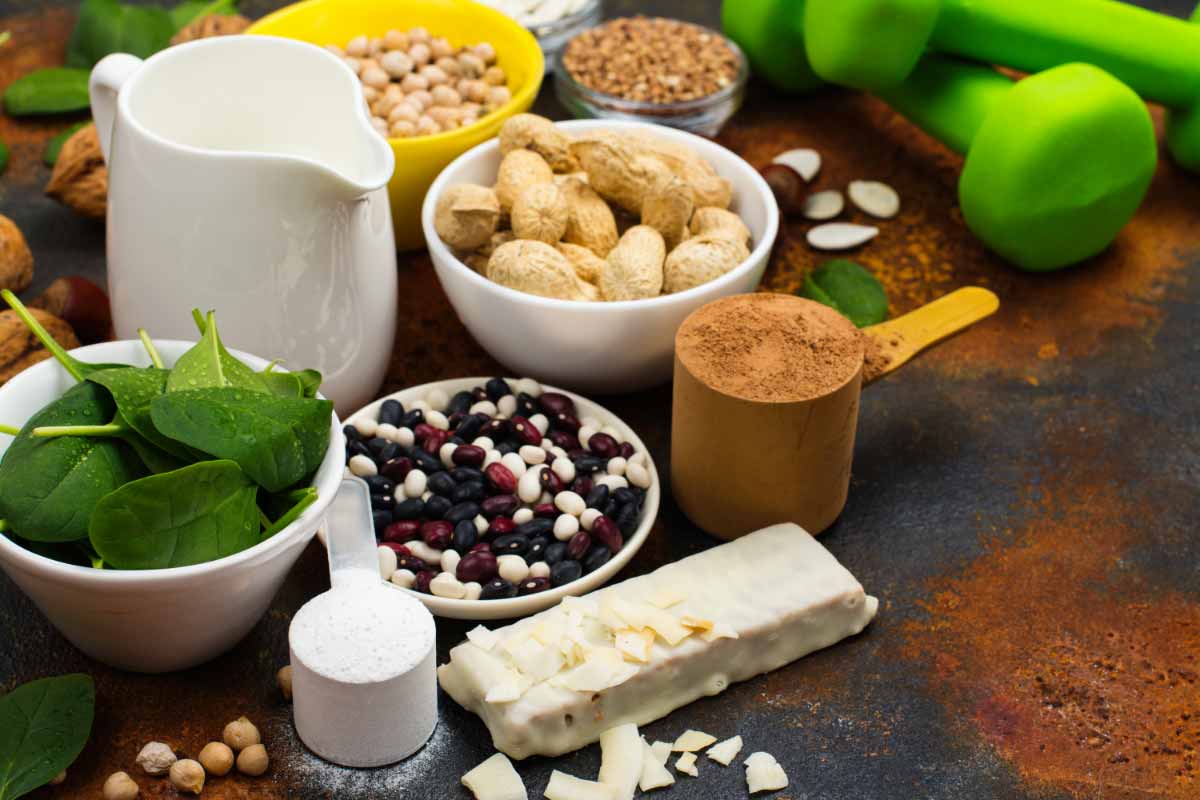Vegan protein powder provides a convenient, supplemental protein source which is free of animal products.
Adequate protein intake for muscle gain and general health is something that plant based dieters can struggle with which has contributed to the rise in popularity of vegan protein powders (1, 2).
Best Vegan Protein
1. Transparent Labs Organic Vegan Rice and Pea Protein
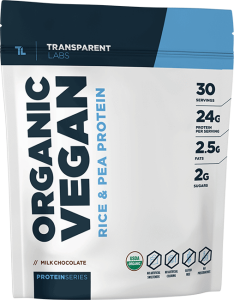
Transparent Labs Organic Vegan Protein has a protein base of 2:1 rice to pea protein ratio. This creates a smooth and reduced grit texture that is not only delicious but easy on the digestive system. In addition to packing a heavy protein punch (at 24 grams), Organic Vegan also contains a whopping 4 grams of fiber per serving (perhaps one of the most understated components of a plant-based protein).
Not only is this protein 100% vegan and free of artificial flavoring and sweeteners, but it is also USDA Organic Certified. For these reasons, it’s our #1 pick.
2. Battle Ready Fuel Vegan Protein
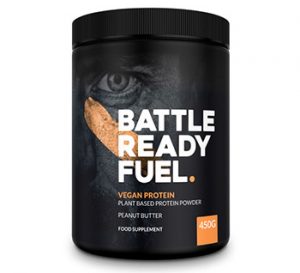
Each serving has 25.5g of protein, plus dietary fiber and digestive aids to help you get more out of every shake. The key ingredients are pea protein and hemp protein, plus inulin, moringa, chlorella, ginger extract (20:1), DigeZyme®, betaine HCI and Bioperine (50:1).
Battle Ready Fuel is so confident you love their product, they offer a 60-day guarantee. It doesn’t get much better than that.
3. Naked Pea Protein
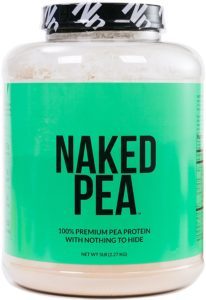
Naked pea protein takes third spot and thieves on their minimalism. It only has one ingredient: 100% yellow pea protein with zero additives.
Naked Pea contains no artificial sweeteners, flavors, or colors and is GMO-free, soy-free, gluten-free, dairy-free and made solely from raw yellow peas grown on environmentally friendly farms in both the USA and Canada.
4. Legion Athletics Thrive Vegan Protein Powder
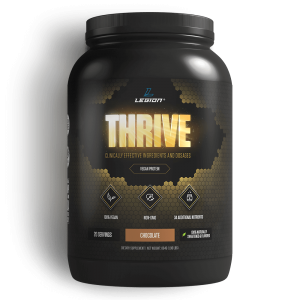
Thrive is a plant protein powder that’s rich in essential amino acids and contains 10 additional nutrients that vegan and vegetarian diets, in particular, tend to lack. These additions include nutrients that improve performance and body composition, like beta-alanine and creatine, to ones that enhance overall health, immunity, and well-being and reduce the risk of disease and dysfunction, like taurine, zinc, vitamin K, D, and B12, and more.
Legion Athletics also included four enzymes in Thrive (amylase, bromelain, papain, and protease) because research shows that they can improve your body’s absorption of the amino acids provided by the protein.
5. Vega Sport Premium Protein
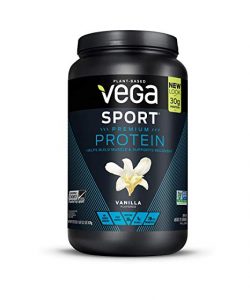
Vega sport is designed for the athlete in mind. It contains tart cherry, turmeric extract, and 2 billion CFU probiotics to assist with recovery post-workout. It contains 30 grams protein per serving, including 5-gram BCAAs and 5-gram Glutamic Acid from a complete, multi-source blend of premium, plant-based protein made from pea protein, organic pumpkin seed protein, organic sunflower seed, and alfalfa
Vega sport also comes in five delicious flavors: Berry, Chocolate, Mocha, Vanilla, and Peanut Butter.
6. Garden of Life Sports Plant-Based Protein
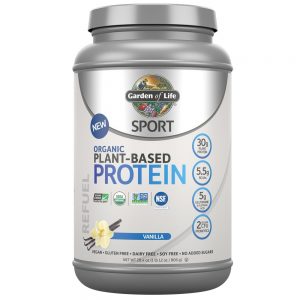
Garden of Life sport plant-based protein powder promotes faster recovery with a high-antioxidant blend of organic tart cherries, organic apples, organic turmeric, organic Gogi berries, and organic blueberries.
This product contains BCAAs amino acid powder and 2 Billion CFU probiotic blend to keep your immune system strong during training. It’s also certified to be free of any banned substances, making it safe for athletes.
7. Orgain Organic Protein
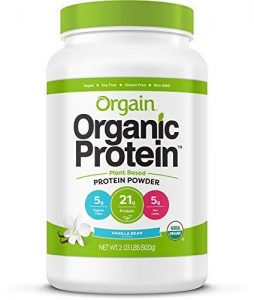
Orgain Organic Protein is ideal healthy, on the go nutrition for men, women, and kids. It contains 21 grams of organic plant-based protein (pea, brown rice, chia seeds), 5 grams of organic dietary fiber, 5 grams of net carbs, 0 grams of sugar, 150 calories per serving.
It’s also USDA organic, vegan, gluten-free, dairy-free, lactose-free, low net carbs, no added sugar, soy-free, kosher, non-GMO, carrageenan-free, and contains no artificial ingredients.
8. Optimum Nutrition Gold Standard 100% Plant
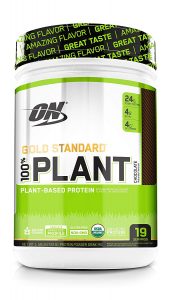
Optimum Nutrition Gold Standard 100% Plant protein contains 24 grams of complete, organic, plant-based protein sourced from a blend of organic pea, organic rice, and organic sacha inchi proteins. It also contains and all-grain complex made with ancient grains amaranth, quinoa, buckwheat, millet, and chia.
It’s a complete amino acid profile to support muscle recovery.
9. KOS Organic Plant Protein
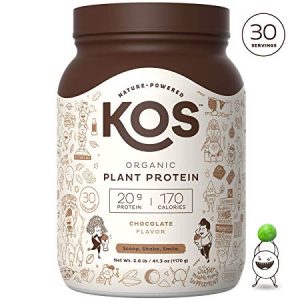
KOS organic plant protein incorporates 100% non-GMO Pea, Flax Seed, Quinoa, Pumpkin Seed, and Chia Seed Protein into our proprietary formula, all of which are USDA organic, gluten, soy, and dairy-free. Their raw vegan protein powder is also composed of healthy fibers and digestive enzymes that help your digestive system run efficiently.
KOS organic plant protein is infused with organic Peruvian cacao, organic Himalayan pink salt, organic coconut milk, a dash of organic stevia and organic monk fruit, for an amazing taste.
10. Pure Food Plant Based Protein Powder
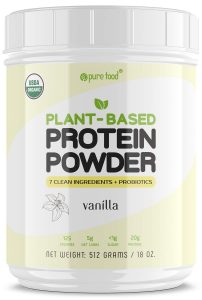
Pure Food plant-based protein is perfect for people with GI sensitivities. Each serving of Pure Food comes with 1 billion CFUs of plant-based probiotics (live beneficial bacteria) and 3 grams of fiber from whole food sources to help boost your GI health and immune system without the gas and bloating.
Their proven probiotic is backed by 25+ clinical studies and is the only strain of its kind with FDA GRAS (Generally Recognized As Safe) approval status. Pure Food contains nothing but simple, safe, certified organic ingredients. Every batch is third-party tested for safety in our cGMP certified facility before being released.
How We Ranked
When ranking the best vegan protein powders, there were a few things to consider. First, we looked at the sources of plant-based protein. Since pea is one of the highest quality protein sources, we ranked products higher that contained it higher, like Thrive+ and Naked Pea.
Next, we looked at the brand. Was the company producing products using non-GMO sources and organic? Were they gluten and dairy-free? Did they use artificial sweeteners and colorings? We had very high standards for this section since all these factors are important, especially in plant-based proteins.
Third, we looked at the complimentary ingredients. We favored companies, like our top pick Battle Ready Fuel, that went the extra mile and included high quality supporting ingredients such as digestive enzymes, probiotics, fiber, and supplemental amino acids. That being said, we did also reward companies that were extremely clean and only used vegan protein in their ingredients for purity.
Lastly, we looked at flavors and mixability. Did the product taste good and did it mix well ( a big problem with vegan proteins is bad mixing ability). Pure Food tended to clump more and was why it was put near the bottom of the list.
Benefits
1. Vegan protein powder made with rice has been shown to improve body composition and exercise performance just as well as whey protein powder (3). Whey protein has often been lauded as an essential supplement for those looking to improve body composition and overall fitness.
This was the first double-blind study ever done on plant proteins versus animal proteins and the results ran contrary to the findings of numerous previous studies that found animal-based protein sources to be superior to plant-based protein sources.
The findings of this study showed that rice protein can be just as effective at reducing fat mass and increasing hypertrophy, strength, power, and lean body mass when administered post-workout.
2. Vegan protein powder made with rice can help combat atherosclerosis (4). A 2010 study on mice showed that consumption of rice protein powder, in comparison to casein protein powder, led to reduced atherosclerotic lesions.
It is often said that one of the mechanisms behind rice protein and other plant proteins that reduce the risk of heart-related diseases is due to an inhibition of cholesterol absorption.
In this study the cholesterol levels of the rice fed group and the casein fed group were the same which may suggest that other mechanisms are responsible. Controlled human studies are still required to further confirm the efficacy of rice protein being able to combat atherosclerosis.
3. Vegan protein powder made with peas can promote muscle thickness gains when taken in conjunction with a resistance training program (5). The study also showed that similar gains were made in terms of muscle thickness and strength in the whey group and the pea group. It was the general consensus for years that plant-based proteins could not match up to animal-based proteins when it came to performance enhancement. This study was one of the first to buck the trend and pave the way for new research into the performance enhancement benefits of plant-based protein powder (6).
4. Vegan protein powder made with peas can help with hunger cravings. A 2016 study that compared the digestion rate and satiety properties of pea, whey and casein protein found that pea protein was effective at triggering satiety signals (7).
The results of this study are part of the reason why pea protein has been promoted as a useful supplement in the treatment of obesity. Pea protein has been shown to suppress hunger and provide a complete amino acid profile making it a viable option for a high protein diet, helping to combat obesity (8, 9).
The suppression of hunger, more specifically the hormone ghrelin, has been shown to play a key role in the success of weight-loss diets (10).
This would suggest that pea protein is a viable option for those seeking general weight loss or weight maintenance and not just obese populations.
5. Vegan protein powder has a high micronutrient profile. Adequate consumption of vitamins and minerals are essential for good health (11, 12).
Vitamins and minerals aid in hundreds of bodily functions from healing wounds to bolstering your immune system.
Although whole foods should always be the primary source of micronutrients having a supplement that provides high doses of vitamins and minerals is a convenient option to have.
Vitamins and minerals become even more important if you lead an active lifestyle or, more specifically, compete in a sport that requires weight cutting such as martial arts or bodybuilding (13).
6. Vegan protein made with peas has been shown to reduce high blood pressure. Pea protein has high quantities of arginine which aids in keeping blood pressure low (14).
The enzymes used in the purification of pea protein may be the main reason for its ability to reduce blood pressure as they are thought to release bioactive peptides which play a role in reducing blood pressure (15, 16).
High blood pressure has strong links to a poor diet. The introduction of plant-based foods and even a switch to a plant-based diet has been shown to reduce the effects of high blood pressure (17).
7. Vegan protein made with soy can reduce high cholesterol and the risk of heart disease (18). The mechanisms by which soy protein reduces cholesterol are not entirely settled amongst the scientific community. It may be a result of the ingestion of soy inhibiting the absorption of cholesterol or the effect of nonprotein components, such as fiber and isoflavones, affecting cholesterol metabolism (19).
8. Vegan protein made with soy has been shown to help reduce the risk of prostate cancer (20). There are still some gaps in the research regarding the effect of isoflavones on prostate cancer but the body of research in this area is growing rapidly. One study showed that 6 months of soy protein consumption led to a reduction in prostate cancer.
The results of a meta-analysis also concluded that the consumption of soy protein is directly associated with a reduction in the risk of prostate cancer among men (21, 22).
9. Vegan protein found in rice may combat oxidative liver stress (23). Oxidative liver stress can be a precursor to chronic liver disease and occurs when there is an imbalance between oxidant and antioxidant agents. This study shows that the inclusion of brown rice in your diet can help combat these effects by regulating glutathione metabolism and oxidative damage to proteins.
While non-protein substances in rice may account for some benefit, other research shows the rice protein itself is a major influencer (24, 25, 26).
10. Vegan protein made with soy helps reduce postmenopausal symptoms. Soy contains high levels of isoflavones, a substance that mimics estrogen. Postmenopausal women can suffer from a reduction in estrogen levels which leaves them susceptible to various side effects (27, 28).
Soy intake has been shown to reduce tumor recurrence in breast cancer women as well as combat high blood pressure, heart disease, endothelial function and atherosclerosis (29, 30).
11. Vegan protein made with hemp can aid in the treatment of heart disease. Hemp is a rich source of linoleic acid (LA) which has been shown to reduce the risk of neurodegenerative diseases, atherosclerosis, coronary heart disease and high blood pressure in some cases (31, 32).
More research is required on LA and it’s efficacy when it comes in the form of hemp but the initial research is encouraging (33).
12. Vegan protein powder is a source of fiber. Vegan protein powder has the added benefit of containing moderate to high amounts of fiber which helps promote a healthy bowel, lower cholesterol levels and maintain healthy body weight (34).
Dietary fiber intake has been shown to play a role in weight management (35).
Data has also shown that dietary fiber intake is below the recommended amount, the American Heart Association recommends 25-30g per day and the data shows the average intake to be just 15g per day. The filling nature of fiber and its main sources may be the reason why the intake is so low which makes a strong argument for the inclusion of vegan protein powders in diets low in fiber intake (36).
13. Vegan protein powder is easily digested and leads to less gastric distress than animal-based sources. Vegan protein powder does not contain any lactose and since lactose intolerance is an ever-increasing problem in many populations vegan protein can be a remedy to this issue (37, 38).
14. Vegan protein powder can help reduce your consumption of bad bacteria. Some reports show that eating animal-based protein exposes you to several harmful bacteria such as salmonella which can only cause you to become ill. Vegan protein powder solves this by making sure the protein only comes from plant sources, not exposed to those kinds of toxins.
15. Vegan protein powder that’s made of peas have all the essential amino acids the body needs. Around 90% of pea is quality protein that contains all the essential amino acids the body needs. These include histidine, isoleucine, lysine, leucine, methionine, phenylalanine, threonine, tryptophan, and valine (39).
All these amino acids are needed by the body in order to perform most of its important functions. Despite pea containing low methionine content, however, this can be easily compensated by introducing brown rice to the diet (40).
16. Vegan protein powder contains lots of iron. Several plant-based proteins contain lots of iron. In fact, a single serving of pea protein powder can contain around 35% of your daily recommended iron intake. Though it’s true that it’s slowly absorbed by the body compared to iron obtained from meat, its absorption, however, can be increased significantly by consuming some vitamin C (41).
17. Vegan protein powder is almost always allergen-free. Even though whey protein is considered highly effective for muscle building, there are some people who are allergic to whey. They tend to suffer from bloating and other similar allergic reactions. For that, plant-based protein is seen as a better alternative. It even makes an excellent choice for those with gluten allergies.
18. Vegan protein powder is better for the environment. Perhaps the most overlooked benefit of vegan protein is that it has a positive effect on the environment due to the environment-friendly processing involved. For one, it needs less land, water, and resources to grow plants needed for plant-based protein compared to its animal-based counterpart.
On the other hand, livestock farms used for producing animal-based protein tend to create massive amounts of waste. They’re also one of the culprits for greenhouse gas emissions which are released into the atmosphere.
19. Vegan protein powder can help you consume fewer calories. Vegan protein powder can help you consume fewer calories but increasing satiety before, during, and after a meal. A 2012 study published in the British Journal of Nutrition showed a 12% reduction in calories consumed when 20 grams of pea protein powder was consumed 30 minutes before eating pizza (42).
Side effects
1. Vegan protein powder made with peas is moderate in purines. Purines break down into uric acid and can badly affect gout, kidney stones, and various digestive disorders. Peas may be only problematic for some. Purines found in plant foods like peas have been shown to be protective against gout in most cases and less problematic than meat, seafood, alcohol, and sugar (43).
If you have suffered from any of the conditions above then keeping the number of purines in your diet low can help to combat the effects of these conditions, though reducing animal protein is more important (44)
2. Vegan protein powder made with peas may be high in sodium. The sodium content will vary depending on the manufacturer – this is an important point for people who suffer from heart-related issues such as high blood pressure (45).
3. Vegan protein powder made with soy contains phytoestrogens. In a 2008 clinical case, three women were admitted to hospital with severe menstrual cramps and uterine bleeding, all of the symptoms regressed when soy was removed from their diet. Phytoestrogens, while beneficial to health in many ways, have also been shown to possibly affect estrogen production in infants and various forms of behavior, ranging from sexual to social, in test subject rats (46).
More research is needed to determine how much of an impact an individual’s genetics and the microbiome have on their risk or benefit of soy consumption.
4. Vegan protein powder made with soy has been linked to allergies. While rarer than milk protein allergy, soy allergy is one of the top 8 allergies and can result in vomiting, skin irritation, abdominal cramps, and anaphylaxis. People who suffer from hay fever are at a greater risk of allergic reactions to foods, including soy (47).
5. Vegan protein powder made with soy can increase the risk of contracting bladder cancer. An epidemiological report looked at 61 cases of bladder cancer and found cause for concern regarding soy intake and the increased risk of bladder cancer (48).
This may be related to the function of the kidneys in excreting metabolites of soy.
6. Vegan protein made with hemp may cause issues with drug testing. THC metabolites can be detected in the urine although the amount is low. Overconsumption of hemp-based protein products could potentially lead to a higher amount and cause issues with drug testing (49).
It is imperative to obtain a hemp protein powder that has been third-party tested or verified to be THC-free or with undetectable levels for athletes that are drug-tested for sport.
7. Vegan protein made with peas is low in methionine. Methionine is one of the nine essential amino acids and plays a key role in cartilage production and protein synthesis (50).
This can be an issue if your diet does not have various sources of proteins to make up for the low methionine content in pea protein. It is for this reason that many plant-based protein manufacturers combine various plant proteins to provide all essential amino acids.
8. Vegan protein made with hemp has low leucine content. Leucine, which is an essential amino acid important for building and repairing muscles, is found in very low amounts in hemp-derived protein. Therefore, if you consume vegan protein made with hemp, you might want to compensate it by consuming lentils and beans.
9. Some vegan protein products might be processed using hexane. Some vegan protein powders might have been processed using hexane, a chemical neurotoxin which is derived from petroleum, to remove oil from plants. Unfortunately, this chemical is discovered to cause damage to the central nervous system.
10. Vegan protein powders are not regulated by the FDA. Another problem with vegan protein powders, like all protein powders, is that they are considered as supplements; therefore, they are not regulated by the Food and Drug Administration. As such, they can vary in terms of purity and quality. According to Harvard Health Publishing, there’s no way of knowing if a supplement actually contains all the ingredients that its manufacturers claim. Due to that, protein powders might actually contain toxic substances like cadmium, arsenic, and lead (51).
Testing conducted by the Clean Label Project found out that out of the 134 protein powder products that are widely known in the market, plant-based powders were the worst, with 75% of them testing positive for lead. This is most likely due to the soil where the plants are grown as well as poor manufacturing practices.
Recommended dosage
When deciding on your daily dosage of vegan protein powder there are a few things to take into consideration.
The first thing to consider is your own daily protein requirements.
In terms of body composition and general health it has been shown that a max of 2 grams of protein per pound of bodyweight (2.0g/kg BW) is the upper limit at which protein intake is seen to be beneficial for most (52)
Chronically high intake above 2.0g/kg BW has been shown to result in significant symptoms of the digestive tract, cardiovascular system and kidney function (53).
Recommended intakes differ based on individual needs, age, health, disease state, and goals. A range of 0.8-1.2g/kg BW meets most people’s protein needs who are sedentary or mildly active. For those who are moderately active, are aiming to lose weight, a higher intake of 1.2-1.5g/kg BW may be justified. Athletes, the elderly, those recovering from injury or surgery and the chronically ill may require even higher amounts, 1.5-2.0g/kg BW.
If you are unsure of your daily protein requirement, follow this simple calculation:
Divide your weight in pounds by 2.2. This equals your body weight in kilograms.
Then multiply your kg body weight by the most appropriate factor above (anywhere from 0.8 to 2.0) and you will have your intake in grams. The National Institute of Health recommends a minimum intake of 0.36g per pound (0.8g/kg) however this will not be enough for those of you who exercise and lead even a fairly active lifestyle (54).
The next consideration is how much protein you are going to get from food. I think it’s worth noting here that just because you use vegan protein powder does not necessarily mean you follow a plant-based diet.
Vegan protein powders are used by people with lactose intolerance, gut issues as well as those who struggle to get enough micronutrients and fiber in their diet.
Animal-based protein powders are low in micronutrients which is why it is recommended that they are not the primary source of protein and that the majority of protein intake comes from food.
Vegan protein powders are much higher in micronutrients and fiber which means that it could be argued that a higher daily amount of vegan protein powder, in comparison to animal-based protein powder, could be recommended.
Despite this argument, I would still recommend getting the majority of your daily protein intake from whole foods.
Taking into consideration all of the above, if you plan to consume protein powder, a range of 25-50g of vegan protein powder per day would be sufficient to help meet most people’s protein needs (even if increased). This typically amounts to 1-2 scoops depending on the manufacturer.
Protein powder can be taken at any time of day and does not have to be consumed solely post workout.
FAQ
Can you build muscle with vegan protein powder? People of all types, can build incredible muscle strength and bulk with plant-based proteins. Researchers found that vegetarian protein is just as beneficial for muscle mass and strength as animal protein. Protein helps repair and build muscle—that’s why it’s smart to recover after a hard workout with a smoothie, energy bites, or another high-protein snack.
Is vegan powder as good as whey? Whey contains all nine of the amino acids and is therefore considered a complete protein. Plants, however, are not complete proteins because they tend to either miss one or more or be low in some of the essential amino acids. This can be remedied by using products with a combination of brown rice and pea protein which then make them similar in efficacy.
Is vegan protein powder safe during pregnancy? Protein powders tend to have higher heavy metal counts than whole foods. Some of these metals are required by the human body but it is best to keep consumption to a minimum. They are only needed in trace amounts. Therefore, be sure to look into the safety, quality, and purity standards of any product, before you make a purchase (55). See the Clean Label Project for a list of products with the lowest levels of contaminants (55).
Is vegan protein powder easy to digest? Vegan proteins contain fewer allergenic proteins like ones found in an egg, dairy, making them more easily digestible for some.
Does vegan protein powder cause acne? Vegan protein powder is less likely to cause acne because it’s plant-based. Dairy has been found to be a major dietary acne trigger, though most often related to the ingestion of skim milk, so vegan protein powder may be the ideal choice for clear skin (56).
Does vegan protein powder cause gas? It is less likely to cause gas than whey, but it is still a possibility. It really comes down to how well your intestines can deal with the product. If it contains inulin, FOS, or chicory root fiber, also known as prebiotics, bloating may occur in individuals with irritable bowel syndrome (IBS). Taking a probiotic can help alleviate any potential symptoms.
Can vegan protein powder help with weight loss and muscle building? Although no protein powder can directly help you lose weight faster, a high-protein diet can, and vegan protein powders make it easier to hit your daily protein needs. It’s also perfect for muscle building because it’s a source of highly bioavailable plant protein rich in essential amino acids, which are the vital building blocks of muscle tissue.
Is vegan protein powder good for you? Yes, vegan protein powder is good for you. It offers a wide range of benefits (similar to why protein) but without the allergens.
What’s the difference between vegan protein powder and plant-based protein powder? There is no difference, it is simply a marketing technique. By definition, all plant-based protein powders must be vegan (after all, if it is not plant-based, it has to be animal-based).
Recap
Vegan protein powders have many health and performance-related benefits. The four sources of vegan protein have unique benefits as well as sharing similar benefits such as helping to reduce blood pressure and providing high levels of micronutrients.
Vegan protein powder got a reputation for being inferior to animal-based sources and it’s still trying to shake off some of that unwarranted criticism. Research in recent years has shown that vegan protein powder can be highly beneficial to any diet and is just as effective as whey protein when it comes to performance enhancement.
Protein powder of any kind should never be relied upon and whole foods should always be prioritized in your diet.
For Healthtrends #1 Vegan Protein Powder recommendation, click here.
